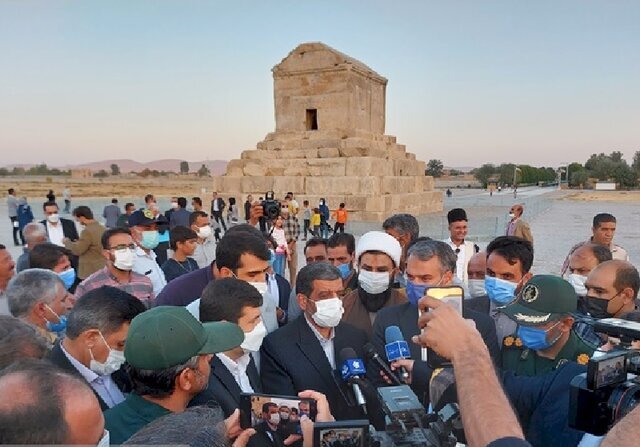Pasargadae is a symbol of human civilization, tourism minister says

TEHRAN- The UNESCO-registered Pasargadae is a symbol of human civilization in ancient Iran, tourism minister Ezzatollah Zarghami has announced.
There is no doubt that Pasargadae belongs to Cyrus the Great, who is regarded as a legend in the world, whether or not he was buried here, it is important to respect him as an Iranian, the minister said on Thursday.
He made the remarks during a visit to the majestic World Heritage site, which is situated in the southern Fars province.
“Pasargadae stands out for its uniqueness on the international stage, if not as a special place, but as a symbol of civil and human development,” he noted.
The tourism status of Pasargadae was among issues discussed with President Ebrahim Raisi during his current visit to Fars…., and funds have been considered for it, the minister added.
He also noted that the majority of funds will be allocated to develop infrastructure and facilities, and making repairs for the public benefit, he said.
There has already been an allocation of 200 billion rials ($4.7 million at the official exchange rate of 42,000 rials per dollar) to the historical site, he mentioned.
Situated about 50 km north of Persepolis, Pasargadae embraces outstanding examples of the first phase of royal Achaemenid art and architecture and exceptional testimonies of Persian civilization.
Cyrus was the founder of the Achaemenid Empire which at its greatest extent stretched from the Balkans to the Indus Valley, spanning 5.5 million square kilometers. The Persian king declared the world’s first charter of human rights, also known as the Cyrus Cylinder.
Despite the minimal nature of the ruins, they make a good introduction to the wonders of Persepolis, some 60km to the south. Best visited en route from Yazd or Isfahan to Shiraz, most people fit them into an extended tour from Persepolis with stops at Naqsh-e Rostam and Naqsh-e Rajab.
ABU/AFM
